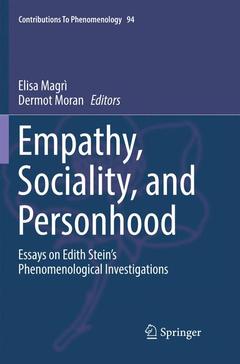Description
Empathy, Sociality, and Personhood, 1st ed. 2017
Essays on Edith Stein’s Phenomenological Investigations
Contributions to Phenomenology Series, Vol. 94
Coordinators: Magrì Elisa, Moran Dermot
Language: English
Subjects for Empathy, Sociality, and Personhood:
Publication date: 12-2018
Support: Print on demand
Publication date: 03-2018
Support: Print on demand
Description
/li>Contents
/li>Biography
/li>Comment
/li>
This book explores the phenomenological investigations of Edith Stein by critically contextualising her role within the phenomenological movement and assessing her accounts of empathy, sociality, and personhood. Despite the growing interest that surrounds contemporary research on empathy, Edith Stein?s phenomenological investigations have been largely neglected due to a historical tradition that tends to consider her either as Husserl?s assistant or as a martyr. However, in her phenomenological research, Edith Stein pursued critically the relation between phenomenology and psychology, focusing on the relation between affectivity, subjectivity, and personhood. Alongside phenomenologists like Max Scheler, Kurt Stavenhagen, and Hedwig Conrad-Martius, Stein developed Husserl?s method, incorporating several original modifications that are relevant for philosophy, phenomenology, and ethics.
Drawing on recent debates on empathy, emotions, and collective intentionality as well as on original inquiries and interpretations, the collection articulates and develops new perspectives regarding Edith Stein?s phenomenology. The volume includes an appraisal of Stein?s philosophical relation to Edmund Husserl and Max Scheler, and develops further the concepts of empathy, sociality, and personhood. These essays demonstrate the significance of Stein?s phenomenology for contemporary research on intentionality, emotions, and ethics. Gathering together contributions from young researchers and leading scholars in the fields of phenomenology, social ontology, and history of philosophy, this collection provides original views and critical discussions that will be of interest also for social philosophers and moral psychologists.
Elisa Magrì is currently an Irish Research Council Postdoctoral Fellow at UCD School of Philosophy. Previously, she held a Newman Postdoctoral Research Fellowship at UCD. She received her Ph.D in Philosophy from the Scuola Normale Superiore in Pisa, and specialises in post-Kantian philosophy and contemporary phenomenology. She is author of Hegel e la genesi del concetto. Autoriferimento, memoria, incarnazione (forthcoming) and co-editor of Hegel e la fenomenologia trascendentale (Pisa: Ets 2015).
Dermot Moran holds the Joseph Chair in Philosophy at Boston College. He was previously Professor of Philosophy at University College Dublin. He has held numerous Visiting Professorships, including Yale University, Northwestern University, Rice University, the Chinese University of Hong Kong, and Boston College. He is a Member of the Royal Irish Academy, and the Institut International de Philosophie. He was awarded the Royal Irish Academy Gold Medal in the Humanities in 2012. His publications include Introduction to Phenomenology (2000), The Phenomenology Reader (co-edited with Timothy Mooney, 2002), Edmund Husserl: Founder of Phenomenology (2005), and Husserl’s Crisis of the European Sciences and Transcendental Phenomenology (2012). He is currently President of the International Federation of Philosophical Societies.
Offers a comprehensive analysis of Edith Stein’s phenomenological investigations
Brings together young researchers and leading scholars in the fields of phenomenology and contemporary philosophy
Highlights new research questions and critical discussions in phenomenology, social ontology, and medical ethics




